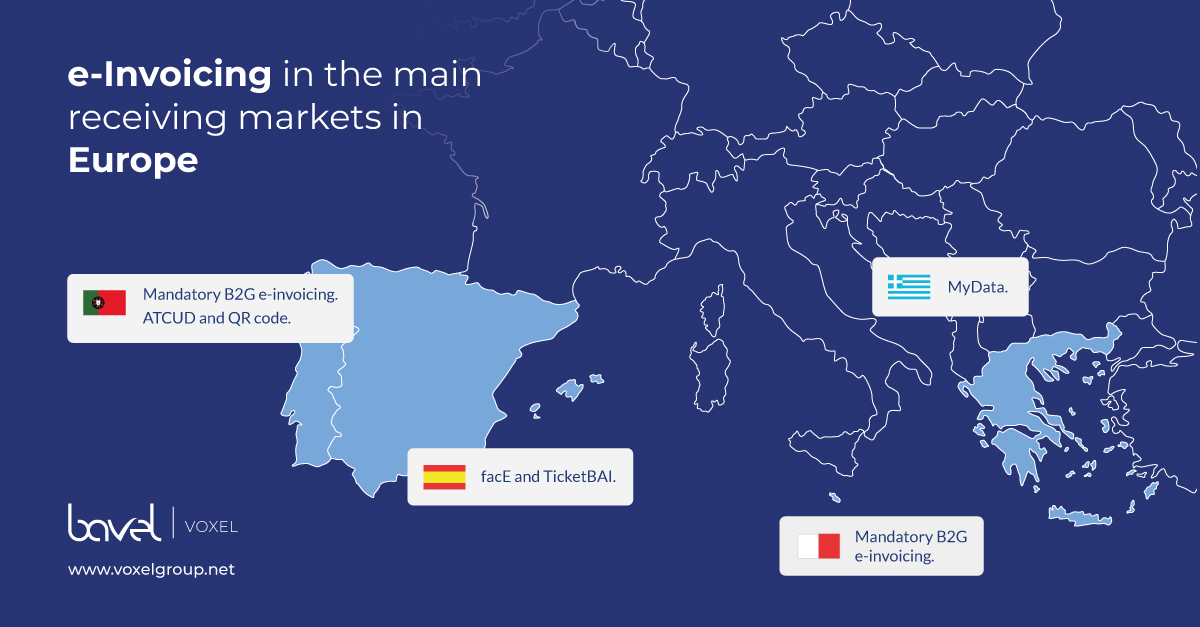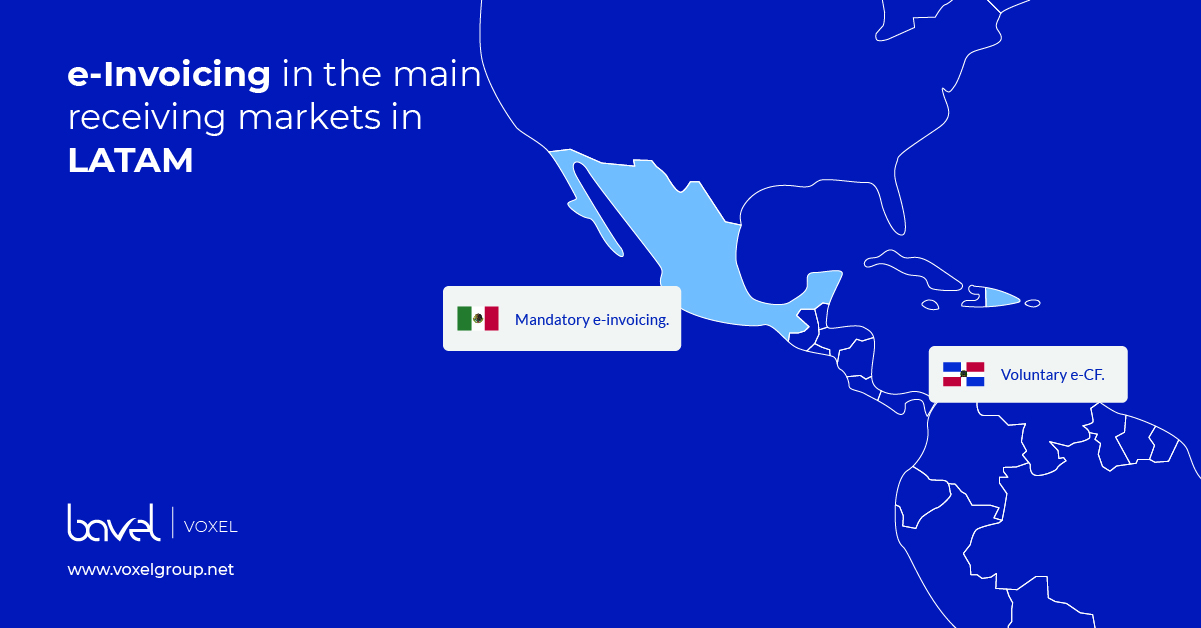As a result of the pandemic, many countries have had to modify their plans regarding electronic invoicing. Taking advantage of the fact that different indicators are beginning to point to the start of recovery, we review the state of e-invoicing regulation in the main receiving markets in Europe and Latin America.
Electronic invoicing in Spain
The regulation of electronic invoicing in Spain has not changed recently.
Thus, B2G electronic invoicing is compulsory through the facE platform, as long as the invoice amount exceeds €5,000.
In B2B and B2C environments, the use of electronic invoicing is not mandatory, but its use is permitted and regulated.
However, companies must electronically declare the details of invoices issued and received (including simplified invoices) within a maximum period of 4 calendar days, through the Immediate Information System (SII). The SII is mandatory for large companies, i.e. those that settle VAT on a monthly basis.
At the same time, companies with tax headquarters in the Basque Country will have to adopt the TicketBAI system from 2022. TicketBAI is a platform through which companies must communicate the invoices and tickets they issue to the tax authorities in real time. Solve the most frequent doubts about TicketBAI here.
Greece finally implements the MyData platform
Greece started working on the implementation of e-invoicing in 2017. But it was not until 2020 that B2G e-invoicing became mandatory in the country.
At the B2B level, e-invoicing is not mandatory, but the Greek government has been developing the MyData platform for some time to implement real-time communication between companies and the tax authority. Finally, the MyData platform will be mandatory as of 1 July 2021.
B2C e-invoicing is not mandatory in Greece.
 Electronic invoicing in Malta
Electronic invoicing in Malta
Following the European Directive 2014/55/EU and in accordance with the national strategy “Digital Malta: 2014-2020”, B2G e-invoicing is mandatory in Malta since 2019.
In the B2B and B2C areas, e-invoicing is not mandatory, but its use is regulated.
In this regard, Maltese legislation allows companies to use an e-invoicing provider. This provider must store the documents guaranteeing their integrity, authenticity and availability and must also include an electronic signature.
The situation in Portugal after multiple changes
Portugal has been one of the countries that have modified its electronic invoicing legislation the most due to the current situation caused by the global pandemic.
After all these modifications, the mandatory use of electronic invoicing in the B2G environment is as follows:
- Large companies: mandatory as of 1 January 2021.
- Small and medium-sized companies: mandatory as of 1 July 2021.
- Micro enterprises: mandatory as of 1 January 2022.
In addition, all invoices will have to include an Invoice Unique Customer Unique Number (ATCUD) and a QR code. The ATCUD and QR code will be mandatory as of 1 January 2022.
B2B and B2C e-invoicing in Portugal are not mandatory, but its use is regulated.
Likewise, companies must periodically submit a report of their invoices to the Tax Agency through the SAF-T (Standard Audit File for Tax) standard.
 Electronic invoicing in Mexico
Electronic invoicing in Mexico
Mexico is one of the first countries in the world to implement mandatory electronic invoicing in all areas (B2G, B2B, B2G). The country has been working on this system since 2004 and almost all companies in Mexico are obliged to use electronic invoicing.
In the Aztec country, the e-invoice follows a clearance model, i.e. e-invoices need government approval to be sent to the recipient.
The “Comprobante Fiscal Digital por Internet” (CFDI) is the format defined by the Tax Administration Service (SAT) for issuing electronic invoices in the country. The process to issue an e-invoice in Mexico follows these steps:
- Generate a file with the structure defined by the SAT in XML. In addition to a digital signature, this document must include the basic information of the transaction.
- Record the exact date and time the document is issued in an electronic system.
- An Authorised Certification Provider (PAC) will check that the document meets all legal requirements and within 72 hours will deliver the invoice to SAT.
- The certified supplier will also be responsible for delivering the invoice to its recipient if it meets all the established requirements.
Mexico’s electronic invoicing model, together with Brazil’s, has served as a model for many other countries, especially in Latin America. In Europe, Italy is the only country that follows a similar model.
The Dominican Republic consolidates its model with standard 01-2020
In February 2019, the General Directorate of Internal Taxes (DGII) of the Dominican Republic launched an e-invoicing pilot programme with 10 large companies in the country to promote e-invoicing at the B2B level.
A year later, the DGII published regulation 01-2020, which regulates the issuance and use of electronic tax receipts (e-CF) for the e-invoicing process. With this regulation, the Dominican Republic joins the majority of Latin American countries, which already have a consolidated electronic invoicing system.
For the time being, the use of e-CF is voluntary. However, many experts predict that the use of electronic invoicing in the country will soon become mandatory. The country has chosen a clearance e-invoicing model, like all its neighbouring countries.
Currently, any company can communicate with the DGII electronically and issue e-CFs. To do so, companies can either develop and implement their own connection with the DGII or do it through a certified provider, such as Voxel Caribe.
Voxel Caribe was the first provider certified by the DGII to issue tax receipts. The benefits of becoming an electronic taxpayer through a technological partner are multiple:
- Know-How: having the experience acquired with other companies in the Dominican Republic.
- Benefit from a robust technology certified by the DGII.
- Having a secure, functional and robust connection process.
- Faster implementation process.
In the Dominican Republic, electronic invoicing is not mandatory in the B2C sector.
 The benefits of electronic invoicing in travel companies
The benefits of electronic invoicing in travel companies
Over the course of a year, travel companies (hotels, bedbanks, TMCs, tour operators, travel agencies, etc.) process hundreds of thousands of invoices corresponding to their customers’ bookings.
The manual management of all these transactions is a major source of inefficiencies and errors and an impediment to the scalability and competitiveness of companies. That is why digitising and automating the issuing and receipt of invoices, payments and derived processes bring great benefits to companies in the travel sector.
Some of these benefits are:
- Reduction of manual errors, claims and derived processing costs.
- Optimisation of reconciliation.
- Increased document control. Traceability of all transactions. Documents are not lost.
- Elimination of physical storage and reduction of paper usage.
- Management of all invoices on a single platform, connected to a network of more than 50,000 hotels and travel companies worldwide.
- The collection cycle is accelerated.
baVel is the leading B2B ebilling and payment platform for the international travel industry. Over the last 20 years we have contributed to the digital transformation of hundreds of companies in the sector by digitising and automating their back office processes.
If you want to know how we can contribute to the digital transformation of your company, contact us at [email protected].




 Electronic invoicing in Mexico
Electronic invoicing in Mexico The benefits of electronic invoicing in travel companies
The benefits of electronic invoicing in travel companies






